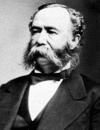- Hampton, Wade
-
died April 11, 1902, Columbia, S.C.U.S. political leader and Confederate army officer.He studied law but never practiced, prefering instead to manage his family's plantations in Mississippi and South Carolina. From 1852 to 1861 he served in the South Carolina legislature. In the American Civil War he organized and led "Hampton's Legion" of South Carolina troops for the Confederate States of America and saw combat in many key battles. He eventually served as second in command under Jeb Stuart. After Stuart's death, Hampton was promoted to major general and led the cavalry (1864). After the war he sought reconciliation but opposed the policies of Reconstruction. As governor of South Carolina (1876–79), he led the fight to restore white supremacy. He later served in the U.S. Senate (1879–91).
 Wade HamptonBy courtesy of the Library of Congress, Washington, D.C.
Wade HamptonBy courtesy of the Library of Congress, Washington, D.C.* * *
▪ Confederate generalborn March 28, 1818, Charleston, S.C., U.S.died April 11, 1902, Columbia, S.C.Confederate war hero during the American Civil War who restored Southern white rule to South Carolina following Radical Reconstruction.Born into an aristocratic plantation family, Hampton graduated from South Carolina College in 1836 and studied law. He never practiced, however, instead devoting himself to the management of his family's landholdings in Mississippi and South Carolina.From 1852 to 1861 Hampton served in the South Carolina legislature. He consistently upheld a conservative position on slavery and secession. When the South seceded, Hampton gave unstintingly of himself and his fortune to the Confederacy. Though lacking military experience, he organized and commanded “Hampton's Legion” of South Carolina troops. He rose from colonel to lieutenant general and saw combat in many key battles. He served as second in command to General J.E.B. Stuart and, after Stuart's death, led the cavalry corps. Wounded three times, he survived to become a military hero to the defeated South and a symbol of the nobility and gallantry of the “Lost Cause.”Hampton backed Pres. Andrew Johnson's plans for Reconstruction and sought reconciliation between North and South. But with the imposition of Radical policies, Hampton took the lead in South Carolina in the fight to restore white supremacy. With the Republicans firmly in control from 1868 to 1876, however, he devoted himself primarily to restoring his greatly depleted fortune. In 1876 he campaigned vigorously as the Democratic candidate for governor. His triumph was largely attributable to systematic efforts by his backers to prevent blacks from voting.Reelected in 1878, Hampton resigned the following year when elected to the U.S. Senate. He served until 1891, defeated for reelection the previous year by “Pitchfork Ben” Tillman. The transition from Hampton to Tillman represented the end of rule by genteel antebellum aristocrats in the South. Hampton served as a commissioner of Pacific Railways from 1893 to 1897 before retiring to Columbia.* * *
Universalium. 2010.
